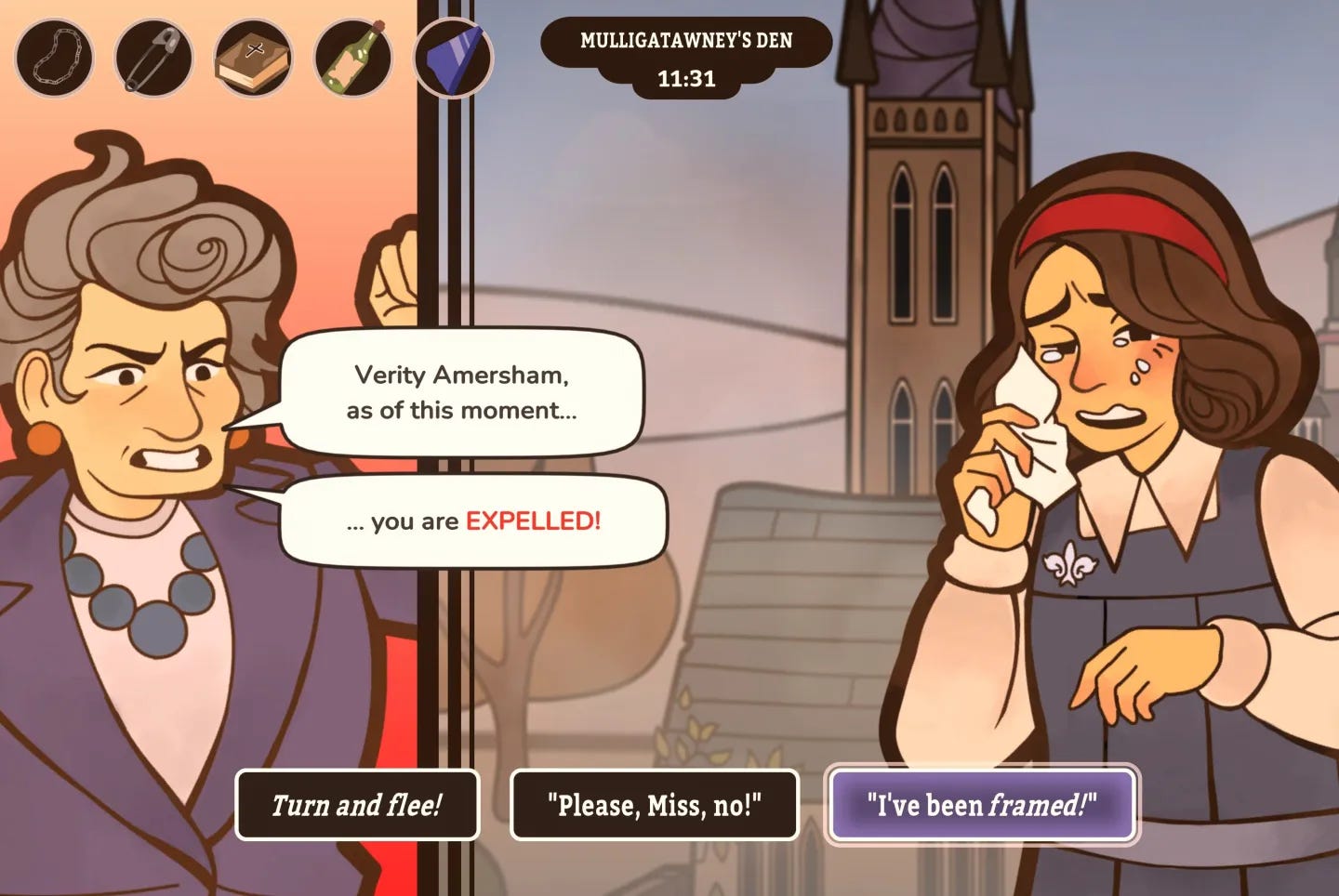Listen to your Elder Scrolls, 13/03/2025
Matt Firor, Studio Director at ZeniMax Online Studios, provides some optimism for live service game developers
Matt Firor discusses his past, the present of The Elder Scrolls Online and the future of live service games
Scopely seals its $3.5bn purchase of Niantic’s games division
Inkle’s Expelled! mixes St Trinian’s with solving mysteries to top the week’s releases
| Find me on Linkedin | Follow me on Bluesky | Wishlist my book | Email me |
Hello VGIM-ers,
I’ve got a few quick bits to update you on before I kick off the newsletter.
First, thanks to all who have applied for the VGIM writer roles I advertised last week. If you’d like to apply to write five editions of the newsletter over the course of the summer, follow the application instructions listed here by Friday 28th March.
Next, I am very much looking forward to meeting many of you at GDC in San Francisco next week. If you’d like to talk but haven’t found time to grab me, drop me an email and I might be able to squeeze you in on Monday or Friday morning.
And finally, I’m on the lookout for a few more VGIM sponsors to support the newsletter later in the year.
If you’d like to support the newsletter described by The FT’s Stephen Bush as “essential”, as “brilliant” by The Rest is Entertainment’s Richard Osman and as “surprisingly good” by a friend who really did mean well, book a campaign here.
Onwards!
The big read - Listen to your Elder Scrolls
Another birthday in VGIM: The Elder Scrolls Online (TESO) has been running for what super professional people working in the games business like to call “a while”. The MMORPG set in the fantasy world of Tamriel celebrated its tenth birthday last year in style and, almost certainly, with copious lashings of jelly and ice cream.
Not so alive service?: But while TESO blew out its metaphorical birthday candles with a hearty puff, 2024 gave a number of the biggest live service game developers a proper pummelling. Companies like Sony (Concord), Warner Bros (Suicide Squad: Kill The Justice League) and Ubisoft (XDefiant) each suffered a major failure, leading to painful job cuts and studio closures in the process.
Scene-setting rhetorical questions: So given last year’s grim state of affairs, what can we learn from TESO’s ability to craft, curate and maintain a virtual world? How did it ride out its early troubles to become the game it is today? And does it tell us much about what other kinds of live service games work in the modern industry landscape?
Predictable follow up sentence: I caught up with Matt Firor, Studio Director at ZeniMax Online Studios, over Zoom to discover his relatively optimistic take about the state of play in live service today.
Virtual worlds, mythological pasts
Long lived: It’s completely accurate to say that Matt Firor has loved virtual worlds for longer than I’ve been alive. His interest in invented landscapes started back in the 1970s where, despite an absence of computers or online games, mythology and fantasy sparked his fascination with imaginatively articulated alternative worlds.
Olympian: “I was obsessed with all of the Greek Gods and the world they lived in,” Matt enthused. “That was my first virtual world. I was just, you know, inhabiting someone else’s [creation] and thinking about what the Gods would do in certain situations.” he said. “It’s interesting to think about ‘well what if they were here, what would they be doing’ and you know just start to get your brain moving.”
The good ol’ days: However, Matt’s ability to exercise the dream of creating virtual worlds within games was relatively limited due to, erm, technological limitations. As he told me rather succinctly, “computers weren’t really a thing in 1975”. But the steady evolution of video games and game technology in the late 1970s and early 1980s allowed Matt to start to translate his interest in immersing himself in literary invented worlds into running wild within interactive ones.
MUDdying the knees: “Fantasy games started coming out, Wizardry first among them, in the early eighties that I got hooked on” he explained. “And you could see that there was a world out there, but obviously the technology was very small and very limiting. But then I got to online games - these modem games which you would call MUDs - that’s when you started to play with other people and you could start creating as a character your own world. And it just blew up from there.”
The man, the Mythic, the Arthurian legend: By the early 1990s, Matt was both playing and designing early online video games. After founding a company called Interesting Systems in 1989 with Rob Denton, Matt’s company merged with Adventures Unlimited Software to create Mythic Entertainment - the online game development studio behind legendary 2001 MMORPG Dark Age of Camelot.
Principles first: And despite the yawning technological gaps between the late 1980s, the release of Dark Age of Camelot and the 24 year jump to the present day, Matt believes the challenge of designing compelling virtual worlds has remained consistent. “At its core, it hasn't changed at all,” he said. “You have to start with a scenario, a set of characters and a set of entities that are in conflict because that’s where good virtual worlds come from. The first virtual world I created from scratch…I put just as much work into that as I did for any of the other games about why [you play], who you are and what you can be.”
Rapid evolution: But while the process of crafting a new universe to play and live in remains somewhat similar, interactions within online experiences changed dramatically over the decades. The arrival of 3D developed worlds, the emergence of immense online communities and the economics of live service play transformed the medium - with the text based MUDs of the late 1980s and early 1990s replaced by 5,000 strong virtual battles in Dark Age of Camelot a little more than a decade later.
New job plus: By August 2007, with online games and MMORPGs in particular proving to be strong business, Matt joined ZeniMax Online Studios. That was when he first started work on The Elder Scrolls Online, a move that has dominated the next 17 years of his professional life.
Transforming Big TESO
Decade-ent: Since its release, TESO has quietly evolved into the kind of live service hit that captivates industry execs. In 2024 during a talk at Game Developer’s Conference celebrating the game’s tenth year online, Matt revealed that it had generated $2bn over the course of its lifespan - making it the most commercially successful game in the Elder Scrolls series. “The tenth anniversary of the game gave us a chance to sit down and look back with a tremendous sense of pride and accomplishment.”
Bloody nightmare: But amidst the congratulatory granting of laurels, the team also had a chance to reflect on how hard it is to keep a live service game afloat. “It’s very, very difficult to make games of this type,” Matt stressed. “I totally believe that this type of game is the most complicated entertainment product ever created because you have to have a great video game, great enterprise, great customer support and you have to keep players’ interest up over time. And that’s hard to do in an industry that’s constantly trying to take your attention away.”
Moving the goalposts: TESO has not proven immune to these challenges over the course of its existence, with the game consistently evolving and changing since it first hit shelves. But the game was actually hardest hit by a change of player expectations during its seven year long development period, when a transformative release in The Elder Scrolls series forced the TESO team to drastically change development course.”
Sweet oblivion: “You have to remember that 2007 [when development started] was like a year and a half after Oblivion launched. Skyrim was nowhere on the horizon, so our North Star was Oblivion,” said Matt “The mandate was take what’s good about that, what’s good from games like Dark Age of Camelot and World of Warcraft and make what I call a Gen 2 MMO which is, you know, tab-target, keyboard mouse and giant UI [user interface].”
Redirected: However, that changed after Skyrim released in 2011. As soon as players started to dive into the super successful RPG also set in The Elder Scrolls universe, Matt said that TESO’s development team “did not have the luxury of using Oblivion as a North Star.”
Mandate change: “You had to basically just be able to sit down as a Skyrim player, not worry so much about the MMO type of player and play the game. That was the mandate that Skyrim’s success forced on us,” Matt explained.
Painful changes: The result appears to be development carnage for the Zenimax Online team. In the three years or so between Skyrim’s launch and the release of TESO, the team had to transform many of the game’s fundamentals. This included switching the game from a third person to a first person perspective, shifting its main combat systems away from frantically tabbing to action based combat and assuming that TESO players were using game controllers rather than keyboards.
Critical consensus: But despite years of hard work, there wasn’t enough time to fully deliver the changes before the game had to launch in August 2014. The result was a mixed critical reception, with Chris Thursten at PC Gamer suggesting that the game was merely ‘okay’ after spending 30 hours in the world. Ouch.
Biding time: For a modern service title, mixed reviews like that might have spelled doom. Fortunately, The Elder Scrolls Online was given time to meet the challenge presented to it by Skyrim. “It was a lot of work for us to do to hit those expectations and when we launched we were only halfway through that,” Matt said. “And so by the end of the second year, we had finally gotten through our list of things that we knew we needed to change.”
On the up: From that point onwards, the game’s fortunes changed dramatically. Two updates in 2015 and 2016 - Tamriel Unlimited and One Tamriel - allowed the team to roll out changes to the game’s business model and its mechanics (e.g. changing the levelling progression system to allow you to explore any part of the map at your choice) that ensured the game fully aligned with the changed expectation of Skyrim players. This finally allowed Matt and the team to turn that game’s success into “far more of a blessing than a curse” for TESO - especially when it came to rolling out engaging content updates rooted in the game world.
Time-fine: “Oblivion was really good in the sense that it showed the existential nature of the way Daedra interacts with Tamriel,” Matt said. “But Skyrim gave The Elder Scrolls this immense sense of history because everything that was happening was in two timelines. You were doing stuff on the surface, but every time you went into a dungeon right there would be a dragon wall that was a thousand years old.”
World building: This was particularly handy for the TESO team. Because the game was rooted in the Elder Scrolls universe and was set hundreds of years before any other games in the series, the developers had a rich seam of lore to mine for its regular updates. This has allowed them to consistently deliver compelling annual updates to TESO that has kept players engaged by letting them take part in beloved aspects of the Elder Scrolls series (e.g. joining the Dark Brotherhood) or expanding the map to include parts of the world they’re fondly familiar with (e.g. Wrothgar from Skyrim).
Steady as it grows: So with its core mechanics fixed, its business model tweaked and content rolling out continually, The Elder Scrolls Online was well placed to grow. And with the player community responding well to the healthy environment Zenimax maintains in its online space - including via well policed terms of service - the game has found itself in a position envied by much of the industry.
Size doesn’t matter: “We’re not one of the biggest games out there, but we’re certainly one of the ones that are successful already,” Matt states factually. And the result of the company’s hard work in building a sustainable in-game community is that it is “easier for us to stay successful” - ensuring TESO continues to thrive even as the wider industry wobbles.
Sage advice
Time is on your side: TESO is in a good place then. But what about the rest of the live service games space? I asked Matt why live service games are struggling and whether a lack of time amongst players is damaging the chances of businesses creating virtual worlds. He smiled at me and gently pushed back against the premise of the question.
Polite rebuke: “I’m only smiling here because one of the previews for Dark Age of Camelot was essentially this looks like it’s a pretty good game but, you know, there’s way too many live service games out there in 2001.” he explained. “And when you look at Helldivers, Valheim and Palworld, it’s not that live service games are struggling as a whole. It’s that you need to be smart about what live service game you’re bringing to the market because there are so many that take a lot of your time.”
Wise counsel: In particular, Matt suggests that game developers who are sustaining or creating live service games steeped in virtual worlds need to make a few changes to their approach to precisely capture the interest - and time - for players.
Fickle feckers: For those at the top of the live service game, Matt believes developers have to get used to the fact that their players are increasingly going to skip their metaphorical towns. “We know that something new and shiny is gonna come up, you’re going to want to play it and that’s fine,” Matt said. That’s why the team has sought to make The Elder Scrolls Online “easy to come back to”, via the implementation of ‘horizontal’ levelling systems that punish you considerably less if you step away from the game for a while and a switch from annual to seasonal content updates to give players more stuff regularly.
Thoughts for the newbies: As for those wading into the live service landscape with the hope of offering players something new, Matt has two thoughts on how to find space for a new virtual world in the market without falling foul of what one friend described to me as “Completely Concording.”
Enemies of perfect: First, developers should focus on getting something good into the market rather than chasing perfection. “Developers often get trapped into thinking they need to compete with the current content in a live service game that’s been running for 15 years at their launch. It’s just impossible,” Matt said. Whereas TESO had both time and resources on its side during its development in the late noughties, lengthy pre-production simply pushes costs and risk upwards - giving developers who deliver something lean to the market a leg-up over their rivals.
Copy cats: Second, and tied to the previous point, Matt also believes that developers can learn plenty from the successes of last year to ensure their new releases land with exactly what players want.
Diving in: “I think from a design point of view, each of them focuses on a different mechanic that’s present in a live service game but they base their entire game around it,” Matt explained. “So Helldivers 2 [developed by Arrowhead Game Studios] is all about co-op player vs environment right and they make no bones about it. They’ve made a great, very community based game that looks a lot like Starship Troopers in an awesome way.”
No time to waste: As a result, everyone benefits from the tighter focus. The developer gets a chance to build a more tightly cost-effective game that allows them to invest more time in worldbuilding (as Helldivers has so successfully done with its “welcome to an international galactic war” framing). Players know much more clearly what they’re going to play and get to jump almost immediately into action, rather than get lost in myriad systems. And perhaps most importantly of all, it lets them invest their time on their terms - enabling both a quickfire round here and there or a whole evening of fun when possible.
Biding time: And this, I think, is the crux of the matter here. Despite the doom and gloom around the games industry, we’re not suffering because people have suddenly decided that virtual worlds aren’t for them. Instead, we’re experiencing a change in where they visit them, how they spend their time there (e.g. on platforms like Roblox) and how much time they’re willing to spend within them.
Rabble rousing conclusion: And while that does mean we will almost certainly need to change the way virtual worlds are designed and maintained to suit these changing habits, the fact that people still love imagined worlds like that of the Elder Scrolls in the way that Matt loved mythology and fantasy in the 1970s is, for me at least, a source of quiet reassurance.
Find out what comes next for The Elder Scrolls Online at the ESO Direct on 10th April.
News in brief
Pokemon Gone: It’s official - Saudi owned Scopely has acquired Niantic’s games division for $3.5bn. The Monopoly Go creator has picked up most of the company’s games (including Pokemon Go and Monster Hunter Go), its entire game development team and relevant associated apps such as Wayfairer and Campfire. The remainder of Niantic’s business has been spun-off into a business called Niantic Spatial which retains control over AR games Ingress Prime and Peridot. And yes, the gameswashing allegations have already started…
Competition continues: Apple has been told it must allow alternative app stores and alternative payment methods on iOS in Brazil within 90 days, following a ruling in court. The Federal Regional Court of the 1st Region reinstated an injunction imposed by the Administrative Council for Economic Defense back in November 2024, which Apple had previously overturned via appeal. Epic Games has already announced its mobile store will be available in Brazil again in July as a result of the ruling.
Tariff troubles: Japanese video games companies such as Nintendo and Sony have seen their share prices plummet following Donald Trump’s decision to levy taxes on China, according to PG Biz. While those businesses have not been hit by tariffs directly, the implementation of levies on components such as semiconductors has indirectly hit games businesses reliant on hardware sales - leading to a 10% and 7% drop in Nintendo and Sony’s share price respectively.
Trial adjourned: The trial of three former Ubisoft executives accused of psychological and sexual harassment for more than a decade has been adjourned until June, reports Le Monde. Serge Hascoët, Thomas François and Guillaume Patrux stand accused of a range of lewd, intimidating and racist behaviour at the studio, including sexual assaults on staff members.
Aloy-t of controversy: Sony has found itself in the crosshairs of generative AI controversy this week, after a video emerged of one of its software developers conversing with an AI powered version of Horizon Zero Dawn protagonist Aloy. Beyond the demo’s unfortunate overall rubbishness (ah, capricious technology), the demo once again shows the tension between the industry’s willingness to experiment with generative AI and its potentially damaging effects on highly valuable intellectual property.
Moving on
Tony Clark is the new Director, EMEA Game Partnerships at Google…A financial shuffle at Sony Interactive Entertainment. Lin Tao has been appointed CFO with Lynn Azar replacing him as SVP, Head of Finance and Operations…More job news at YRS TRULY with James Whatley joining the board as an advisor, while Annabelle Shoel has been promoted from Marketing Assistant to Campaign Executive…Sean Megaw is the new Director of Business for AppCharge in North America. Jin Woo Hong has also landed at the company as Managing Director for its Korean Business…
Jobs ahoy
2K is hiring an Applied Scientist to work out of its Dublin office. Insert your own jokes about application levels here…Halo Studios has reposted its Creative Director role…Code Wizards are looking to conjure up a DevOps Engineer in Edinburgh…Amazon Games wants a VGIM reader/another qualified applicant to become its Lead Publishing Producer down in Landddaaaaaannnnn…And Roblox is recruiting a Content Designer over in San Mateo…
Events and conferences
Hit Games Conference, Istanbul - 14th March
Game Developers Conference, San Francisco - 17th-21st March
Games Industry Law Summit On Tour, Rome - 1st-3rd April
London Games Festival, London - 2nd-13th April
BAFTA Game Awards, London - 8th April
Games of the week
Expelled! - Solve the crime - or get someone else to take the fall for it - in the school based spin-off of the BAFTA nominated Overboard!
MLB The Show 25 - Let’s go out to the ball game? Find out whether it is worth a virtual trip out to play baseball on console this Friday.
Out of the Park Baseball 26 - Two baseball games released in one week? That’s insane, Jeremy.
Before you go…
What’s the most influential video game of all time? BAFTA is asking for your answers to this delightfully impossible question to help push this year’s Game Awards.
The best answers will then be rolled into a publicity campaign for the awards in the manner of last year’s Most Iconic Character poll, which got picked up just about everywhere. Natty.
Submit your answer to the question - which you can respond to however the hell you like - before Thursday 20th March on the BAFTA website here.







